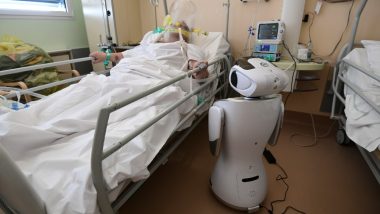New Delhi, October 22: The COVID-19 pandemic is making companies automate their workforce faster than expected globally, while firms with operations in India are accelerating their automation and digitisation above the global average, a World Economic Forum (WEF) study showed on Wednesday.
The year-long study on effects of automation in the workplace and the outlook for robot revolution found that the ‘future of work’ has arrived early due to COVID-19 and may lead to 85 million jobs getting displaced in the next five years in medium and large businesses across just 15 industries and 26 economies. Robots Deployed to Serve COVID-19 Patients in Sir Sayajirao Gaekwad Hospital in Vadodara.
At the same time, the robot revolution will create 97 million new jobs, but communities most at risk from disruption will need support from businesses and governments, the World Economic Forum said. These new jobs would mostly emerge in the care economy, in fourth industrial revolution technology industries like artificial intelligence, and in content creation fields.
"Businesses with operations in India are accelerating automation and digitisation above the global average. While 58 per cent are accelerating automation of tasks, compared to 50 per cent globally, as many as 87 per cent are accelerating digitalisation of work processes, above the global average of 84 per cent," the study showed. Coronavirus Outbreak in Italy: Doctors Seek Help From Robots to Check Pulse of Highly Infectious COVID-19 Patients.
By 2025, employers will divide work between humans and machines equally. Roles that leverage human skills will rise in demand. Machines will be primarily focused on information and data processing, administrative tasks and routine manual jobs for white and blue-collar positions.
The tasks where humans are set to retain their comparative advantage include managing, advising, decision-making, reasoning, communicating and interacting. There will be a surge in demand for workers who can fill green-economy jobs, roles at the forefront of the data and artificial intelligence economy, as well as new roles in engineering, cloud computing and product development.













 Quickly
Quickly




















